Health+ Wellness
Simple Steps to Prevent Colorectal Cancer

Healthy habits reduce your risk for cancer in the colon or rectum
Colorectal cancer is one of the most common types of cancer in the United States, and it also is one of the most easily detected and treated, especially if discovered early. In fact, thanks to early detection methods, colorectal cancer is increasingly prevented from happening at all.
Dr. Victor Pricolo, Southcoast Health’s Chief of General Surgery and Colorectal Surgery, says the best method of screening and prevention is a colonoscopy. This half-hour procedure enables doctors to examine the entire colon by using a small flexible tube inserted through the rectum. Patients are sedated for the procedure and able to return home, with the help of a driver, shortly after the test.
If the colon looks healthy, another colonoscopy is recommended 10 years later, as long as no symptoms occur. If abnormal growths (polyps) are found, they need to be removed to prevent them from developing into cancer. Polyps that are removed are subjected to a microscopic exam and, if they are deemed to be pre-cancerous, the patient will need to undergo a colonoscopy every three to five years.
The importance of colonoscopy
Increased use of colonoscopy has greatly reduced both the incidence and the mortality of colon cancer during the past 30 years in our country.
Since this type of cancer rarely produces any symptoms at all in its early stages, regular screening is vital for both men and women at age 50, or at age 40 if there is a family history of colon cancer.
The availability of the latest technology at Southcoast makes colonoscopy an even more powerful tool, Dr. Pricolo says. A high-definition screen provides a finely detailed image to better examine the colon, and narrow band imaging technology shows sharp color differences between normal and abnormal lining of the bowel.
“Advanced techniques allow our doctors to identify and remove even so-called flat lesions, with may not be detected as readily by conventional colonoscopies,” Dr. Pricolo says.
The most common symptom of colorectal cancer is blood in the stools, which may be visible or detected by stool tests for occult blood. At times, patients may experience weakness from a low blood count, abdominal pain or changes in bowel habits. If you experience any of these symptoms, seek medical attention without delay.
When colorectal cancer care is needed
Patients who do develop colorectal cancer can be confident that they will get the best available care at Southcoast Health Centers for Cancer Care. Dr. Pricolo, who is Southcoast’s liaison to the Commission of Cancer, said the system offers a full continuum of care with quality that is nationally recognized for its excellence.
“There is no aspect of colorectal care that we do not offer at Southcoast Health,” he says.
Learn more about Southcoast’s colorectal care and surgery.
